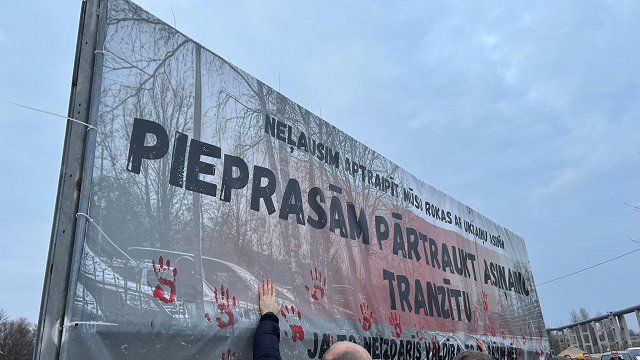Yuri Antipov, owner of the Chelyabinsk plant, was detained by Russian forces in February. A case of fraud has been opened against him. Three factories he owned in Chelyabinsk were nationalized.
A representative of companies working in Latvian ports confirms that indirect cooperation with the Chelyabinsk Electrometallurgical Plant has effectively ended.
"When we spoke to the specific terminals that were sending these cargoes to this particular consignee, they practically confirmed that this business is over. I think that the last trains are leaving or have left, and it is understandable that at this point no bank will be ready to transact with the Russian government," says Jānis Kasalis, a member of the Council of the Latvian Stevedoring Association.
The largest producer of manganese ore, whose production has gone to Russia via Latvia, is UMK, part-owned by Russian oligarch Viktor Vekselberg. It is based in Kalahari in South Africa, where 80% of the world's manganese ore is mined.
According to both South African and international media, Vekselberg's partners in this business are closely linked to the ruling party in South Africa. Vekselberg is on the sanctions lists of the US, the UK, and some other countries, but not the European Union. He does not have a majority in UMK, but 49%, which allows the company to escape US sanctions.
"As far as Mr Vekselberg or others are concerned, I am not going to tell you what the percentages are and from which mines, because there are many different mines in South Africa. [...] As far as I know, there have been no issues with customs, no interdictions in this flow," said Kasalis, the stevedores' spokesperson, of the manganese ore shipments from Vekselberg's mines.
Manganese ore was also transported by rail to Russia via the ports of Riga and Ventspils before Russia's full-scale invasion of Ukraine. But it was in 2022 that volumes surged, exceeding one million tonnes. Last year, it rose further to almost 1.5 million tonnes.
According to information gathered by De facto from ports, databases, and several industry sources, the leading transshipment port for manganese ore in recent years has been the commercial port of Ventspils. It is controlled by the Swiss Rudolf Meroni. He manages part of the company as custodian of assets seized in the criminal case of Aivars Lembergs. Manganese ore has also been transshipped by Riga Coal Terminal, which is indirectly half-owned by the families of former Prime Minister Andris Šķēle and Saeima MP Ainārs Šlesers.
BLC, Alfa Shipping Company, SRR Logistics, and LDz Logistika have also been involved in the transit of manganese ore to Russia. These companies do not have their own terminals, so they have used "Stena Line Ports Ventspils", "Eurohome Latvija", "KS Terminal" and "Rīgas Centrālais termināls".
None of the port companies involved responded to an interview. Stena Line Ports Ventspils replied in writing that it respects the sanctions imposed and will take into account changes, if any. KS Terminal also explained in a written reply that they comply with the sanctions, provide services to a logistics company, and do not have contracts with companies in Russia. A similar statement was issued by Riga Coal Terminal in mid-March.
LDz Cargo, a subsidiary of Latvian Railways, has also transported cargoes of manganese ore, although much less last year. Information gathered by De Facto indicates that another subsidiary of Latvijas Dzelzcels, LDz Logistika, acted as a freight forwarder or shipper of manganese in Latvia. The railway company stresses that no subsidiary had any contracts with the Chelyabinsk plant.
"This is the first time I have heard such specific information [about LDz Logistika]. Until now I had information that LDz Cargo is one of the carriers, with a 5-6% share in total transport. I will certainly check this information for any closer involvement. But here, of course, under the leadership of the Ministry of Foreign Affairs, as part of the strategic goods control process, it is then necessary to define whether these cargoes are dual-use, or whether they could end up at the disposal of the Russian military industry," said Transport Minister Kaspars Briškens (Progressives).
Estimates of the impact of the manganese ore ban on the Latvian economy are rough. Minister of the Economy Viktors Valainis (Greens and Peasants Union) mentions several million lost in port fees and more than €10 million lost for the railways.
A €20-25 per tonne impact is calculated by the port companies, which do not agree to the exposure of manganese ore to sanctions.
The idea of stopping the flow of cargo to Russia altogether, even starting with the state-owned Latvian Railways, has been floated from time to time in discussions. Finance Minister Arvils Ašeradens said that in Estonia, where a similar step was taken, the railway is facing bankruptcy and that the budgetary impact would also be felt in Latvia. "Let's put it this way - if we stop it in one moment, the losses will be very big. If we give time to rebuild, it will be relatively smaller. (...) Railways, I think, would require at least €100 million a year in support," estimated the Finance Minister.
Manganese ore transhippers use the tight budget situation as an argument in their favor, noting that the country cannot afford national sanctions.
On Friday, Latvijas Dzelzceļš issued a statement calling on the group's companies not to make new commitments to transport groups of goods potentially on the EU sanctions lists through Latvian territory.






























